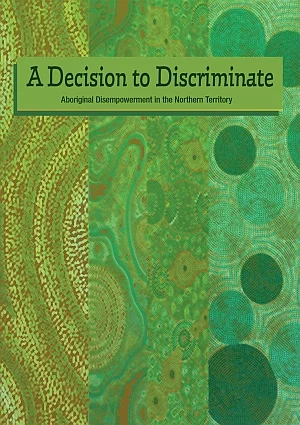A Decision to Discriminate
A Decision to Discriminate
'A Decision to Discriminate' is the latest book in a series of highly regarded publications by ‘concerned Australians’. These include “This Is What We Said”, “Walk With Us” and “NT Consultations Report 2011: By Quotations”.
”A Decision to Discriminate” demonstrates how our democratic processes failed Aboriginal peoples of the Northern Territory. It shows the process leading to decisions which were deeply flawed; a process miserably failing the people who provided evidence to its inquiries by ignoring their clearly expressed views and instead pushing the legislation through the House of Representatives before the Senate Inquiry report had been completed.
The events described here took their origins in 2007, when the government introduced the “Northern Territory Emergency Response” (NTER, commonly known as “NT Intervention”). This measure was set to last for 5 years, and shortly before its end of term the parliament passed a new legislation, ‘Stronger Futures’ on 29 June 2012.
This legislation imposes discriminatory legislation on Aboriginal peoples of the Northern Territory, effectively extending the failed Northern Territory Intervention for another ten years.
The responsible Minister at the time, Jenny Macklin, gives as reason for the new legislation: “Well the message loud and clear from Aboriginal people, from parents and grandparents is that they want this.” There were over 450 submissions to the Senate Inquiry into the Stronger Futures Bills, coming from a diverse range of people and organizations including Aboriginal communities, lawyers, welfare agencies, human rights groups and churches.
The vast majority were highly critical of the Bills, e.g. Dr Gondarra OAM, Dhurili Clan Nation said: “… please do not let us down and say, ‘This is the legislation we are going to deal with, because the Aboriginal people are naughty boys and naughty girls and so we need to look after them and we need to treat them this way.’
No, we do not need that. We are not a puppet on a string. You do not play around with us. We want to be a free people. We want to determine our dignity and pride in being a people. That is the message that we are giving.”
Even some politicians acknowledged the rejection of these Bills, eg, Senator Scullion, the Shadow Minister for Indigenous Affairs, when he said: When we get to most communities any observer would say that Aboriginal people more generally hate the Intervention.
They do not like it, it invades their rights and they feel discriminated against. Despite of all the evidence and a huge number of voices speaking out against the “Stronger Futures” legislation, it received bipartisan support in both houses of the parliament and was passed with almost no opposition.
The Hon. Alastair Nicholson AO in the foreword to the book makes the point, What I find almost equally disturbing as the policy of ignoring the participation and input of Aboriginal people into the decision making process is Government willingness to perpetuate and cloak racial discrimination against them as so called ‘special measures’ purporting to protect them, while at the same time abandoning any semblance of compliance with international obligations.
Unfortunately the voices of Aboriginal peoples are seldom heard in the public domain. In the tradition of its predecessors this book uses quotes as a way of recording what the people have said.

